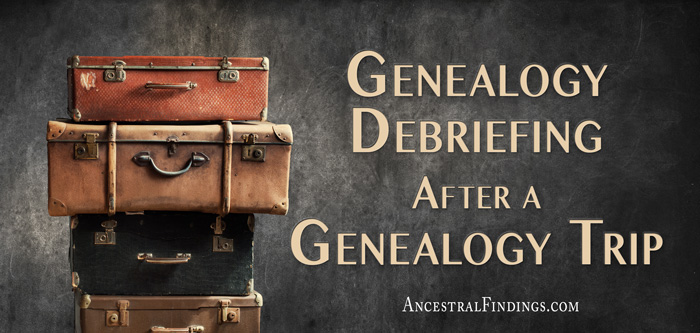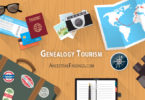Even with the wealth of genealogical information available online these days, there is still no substitute for good, old-fashioned “field work” when it comes to finding your ancestors. For one thing, some genealogy records aren't available online yet, and you must go to local courthouses, historical societies, and town archives to find them. Also, FindAGrave.com isn't the be-all and end-all of cemetery research… going to the actual cemetery where your ancestors are buried will reveal stones that haven't been photographed for the Internet yet, and show you where these stones are in relation to each other, which can reveal family relationships.
Finally, there is nothing like walking in the footsteps of your ancestors, seeing the towns where they lived, looking at things from their perspective, and maybe even finding the house where they resided (or where it used to be). These are the details that bring your ancestors to life again and tell you so much more about who they were as human beings than any name or date on a family tree ever could. These are the reasons you need to take genealogy research trips. Here's how to plan your next one to make sure you get the most out of it.
Know What You Need to Find and Where to Find It
Once you've decided which ancestor's hometown you are going to visit on this trip, you need to know what you want to find when you get there. It will do you no good to just wander around town, hoping to find something that will tell you more about your ancestor and their family. Do some research online before you go to determine what records are kept where and how to access them. Also, find out where the local cemeteries are and if any of them have working offices. Finally, get the locations of any local historical societies, museums, archive buildings, public libraries, and/or town historians.
Next, make a list of the things you believe you might find in the town you're going to visit. Break your trip down into a schedule of the places you'll be visiting each day you're there, and what you will be looking for in each place. Print this list off and keep it handy, checking things off as you go. Your trip will be much more organized that way, and you'll likely find a lot more genealogical gold than if you went without such a detailed plan.
Some of the things you may want to locate on a genealogy research trip and where they might be located include:
- Vital records (birth, marriage, and death records) that aren't available online (the town clerk or county courthouse)
- Old wills and/or estate inventories (the county courthouse)
- Old newspaper records that mention your ancestors (town archives, newspaper office, or public library)
- Land records of where your ancestors lived (county courthouse or town clerk)
- Personal papers and belongings of your ancestors (county courthouse, historical society, town archives, town historian, or town museum)
- Books on your ancestors (historical society, town historian, or public library)
- Cemetery records (town historian or town clerk)
- Headstones (local cemeteries)
- The home or location of the home of your ancestors (the land records you found at the courthouse or clerk's office)
Don't try to do too much in one day, or you'll get burned out. It's best to divide your trip into morning and afternoon sessions, where you do one thing during each session. Plan for enough days on your trip to get everything done, plus an extra day for exploring any particularly rich treasure troves of records you may find while you're there.
What to Bring
Being organized for your trip is essential to having a good experience and finding all you can while you're there. However, you want to be sure you're locating the right things, organizing them properly, and recording them immediately so you don't lose track of this research later and have to repeat it. This is why you absolutely must pack the following things to bring on your trip:
- A laptop computer with your family tree software installed on it
- A digital camera (either a standalone or the camera on your smartphone will do)
- A three-ring binder with pockets
- Change for making copies (or purchasing them)
- Money for admission to museums and historical societies
- A notepad and at least three sharpened pencils
- Gardening gloves
- A gardening trowel
The Purpose of These Items
Your laptop goes with you wherever you go. Any time you find a new record, you must record the information you find on it into your family tree software, including where and when you found the information (citing sources is crucial in proper genealogy). You should use your camera to take pictures of anything that you are allowed to photograph, and include those photos in your family tree software.
The binder is for keeping copies of records or other information you obtain. The notepad is for taking notes off of records that you cannot photograph or copy. It can also be used to write down leads you may come across on your trip for alternate locations of the records you seek.
As far as the gardening materials go, these are optional. If you go to an old family cemetery and find the place is not kept up and your ancestors' headstones are overgrown with weeds or encrusted with dirt, you can clean them up a bit out of respect and make them look nicer. A lot of genealogists do this as a matter of course when on genealogy trips.
Your next genealogy trip can be a very rewarding experience. All you have to do is make sure you're prepared when you go. Know what you're looking for, know the possible places where you may find it, and bring what you need to record what you find and keep the information organized. You'll come home with a whole new relationship with your ancestors, knowing them better than ever and appreciating them as people so much more.



